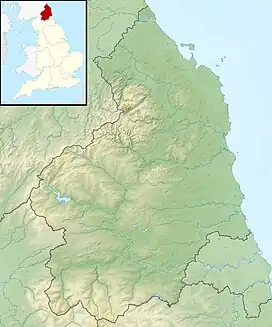Benwell Dene
Benwell Dene is a Victorian building in the suburb of Benwell, Newcastle Upon Tyne, England. It was designed by Alfred Waterhouse for Dr Thomas Hodgkin and was built in 1865. Hodgkin donated the house to the Royal Victoria Home in 1894, and bequeathed the gardens and grounds to the people of Newcastle as a public park. The building subsequently became the Royal Victoria School for the Blind. After the school's closure in 1985, the structure was converted into a hotel. It is a Grade II listed building.
| Benwell Dene | |
|---|---|
.jpg.webp) | |
| Type | House |
| Location | Newcastle upon Tyne, Northumberland, United Kingdom |
| Coordinates | 54.9726°N 1.6695°W |
| Built | 1869–1895 |
| Built for | Dr Thomas Hodgkin |
| Architect | Alfred Waterhouse |
| Architectural style(s) | Tudor Revival |
| Governing body | Privately owned |
Listed Building – Grade II | |
| Official name | Royal Victoria School for the Blind |
| Designated | 17 December 1971 |
| Reference no. | 1024958 |
Listed Building – Grade II | |
| Official name | Lodge to Victoria School for the Blind |
| Designated | 30 March 1987 |
| Reference no. | 1116529 |
 Location of Benwell Dene in Northumberland | |
History
The Hodgkin family made their careers in finance, science, medicine and the arts. Following their Quaker faith, they were also notable philanthropists. Thomas Hodgkin (1831–1913) was the grandson of John Hodgkin (1766–1845), the family's founder.[1] Thomas Hodgkin's profession was banking, and he founded the family finance house of Hodgkin, Barnett, Pease, Spence & Co. based in Newcastle.[2] His primary interest was historical research and his fame largely drives from his 8-volume history, Italy and her Invaders, published between 1880 and 1899.[3] In the 1860s, Hodgkin settled in the West End of Newcastle Upon Tyne, in the suburb of Benwell, and commissioned Alfred Waterhouse to build him a house.[4] Waterhouse had already undertaken work in Newcastle and elsewhere for the Pease family, fellow Quakers and partners in Hodgkin's bank.[lower-alpha 1][5] Hodgkin raised his family of seven children at the house, including Robert Howard Hodgkin, later a historian and Provost of The Queen's College, Oxford.[6]
Thomas Hodgkin donated Benwell Dene to the Royal Victoria Home in 1894. The grounds were given to the people of Newcastle to form Hodgkin Park.[7] The house subsequently became the Royal Victoria School for the Blind which remained at Benwell for 90 years until its closure in 1985.[8] The building was subsequently converted into a hotel.[9]
Architecture and description
Benwell Dene is built of sandstone to a courtyard plan, with two storeys and attics. The architectural style is "Tudor Gothic".[4] It is listed Grade II on the Historic England register, as is the lodge at the head of the drive.[4][10]
Footnotes
- Alfred Waterhouse subsequently designed Pendower Hall in Benwell for John William Pease (1836–1901), Hodgkin's business partner and brother-in-law.[5]
References
- "Hodgkin family". Wellcome Collection. Retrieved 21 November 2021.
- "Hodgkin, Barnett, Pease, Spence & Co. records". archiveshub.jisc.ac.uk. Joint Information Systems Committee. Retrieved 21 November 2021.
- "Italy and her invaders, Thomas Hodgkin". Wellcome Collection. Retrieved 21 November 2021.
- Historic England. "Royal Victoria School for the Blind (Grade II) (1024958)". National Heritage List for England. Retrieved 21 November 2021.
- Pevsner & Richmond 2002, p. 514.
- "Robert Howard Hodgkin (1877–1951), Provost (1937–1946)". artuk.org. Art UK. Retrieved 21 November 2021.
- "Hodgkin Park". Urban Green Newcastle. Retrieved 21 November 2021.
- "Royal Victoria School for the Blind Newcastle upon Tyne". National Archives. Retrieved 21 November 2021.
- "Grainger House Hotel filing history". Companies House. Retrieved 21 November 2021.
- Historic England. "Lodge to Victoria School for the Blind (Grade II) (1116529)". National Heritage List for England. Retrieved 21 November 2021.
Sources
- Pevsner, Nikolaus; Richmond, Ian (2002). Northumberland. The Buildings Of England. New Haven, US and London: Yale University Press. ISBN 978-0-300-09638-5.